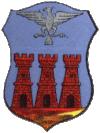Favignana
| Favignana | ||
|---|---|---|
| Comune | ||
| Comune di Favignana | ||
 |
||
|
||
| Location of Favignana in Italy | ||
| Coordinates: 37°56′N 12°20′E / 37.933°N 12.333°E | ||
| Country | Italy | |
| Region | Sicily | |
| Province / Metropolitan city | Trapani (TP) | |
| Frazioni | Levanzo, Marettimo | |
| Government | ||
| • Mayor | Lucio Antinoro | |
| Area | ||
| • Total | 37 km2 (14 sq mi) | |
| Elevation | 6 m (20 ft) | |
| Population (2007) | ||
| • Total | 4,383 | |
| • Density | 120/km2 (310/sq mi) | |
| Demonym(s) | Favignanesi | |
| Time zone | CET (UTC+1) | |
| • Summer (DST) | CEST (UTC+2) | |
| Postal code | 91023 | |
| Dialing code | 0923 | |
| Website | Official website | |

Punta Sottile Lighthouse
|
|
|
Sicily
|
|
| Location | Punta Sottile Favignana Sicily Italy |
|---|---|
| Coordinates | 37°56′06.2″N 12°16′20.4″E / 37.935056°N 12.272333°ECoordinates: 37°56′06.2″N 12°16′20.4″E / 37.935056°N 12.272333°E |
| Year first constructed | 1860 (first) |
| Year first lit | 1904 (current) |
| Construction | tuff tower |
| Tower shape | tapered cylindrical tower with balcony and lantern atop 1-storey keeper’s house |
| Markings / pattern | unpainted tower, grey lantern dome |
| Height | 38 metres (125 ft) |
| Focal height | 43 metres (141 ft) |
| Current lens | type OR S4 focal length: 250 mm |
| Light source | mains power |
| Intensity | 1000 w |
| Range | main: 25 nautical miles (46 km; 29 mi) reserve: 15 nautical miles (28 km; 17 mi) |
| Characteristic | Fl W 8s. |
| Admiralty number | E1952 |
| NGA number | 10020 |
| ARLHS number | ITA-145 |
| Italy number | 3104 E.F. |
| Managing agent | Marina MIlitare |
Favignana is a comune including three islands (Favignana, Marettimo and Levanzo) of the Aegadian Islands, southern Italy. It is situated approximately 7 kilometres (4 miles) west of the coast of Sicily, between Trapani and Marsala, the coastal area where the Stagnone Lagoon and the international airport of Trapani, are sited.
The island of Favignana is famous for its tuna fisheries and is now a popular tourist destination with frequent hydrofoil connections to the mainland.
In ancient times Favignana was called Aegusa, meaning "goat island" in Greek (Αιγούσα). The present name is derived from Favonio, an Italian name for the foehn wind. The Phoenicians established an outpost on the island as a stopping point on their trans-Mediterranean trading routes until the defeat of the Carthaginian army during the First Punic War.
On 10 March 241 BC, a major naval battle was fought a short distance offshore between the two powers. Two hundred Roman ships under the consul Gaius Lutatius Catulus met and decisively defeated a much larger Carthaginian fleet of 400 ships, with the Romans sinking 120 Carthaginian vessels and taking 10,000 prisoners. So many dead Phoenicians washed ashore on the northeastern part of Favignana that the shoreline there acquired the name "Red Cove" (Cala Rossa) from the bloodshed (incorrect: red from the red clay on the beach and not for the bloodshed). The Romans took possession of the island under the terms of the treaty that ended the war.
In the early Middle Ages, Favignana was captured by Arabs and was used as a base for the Islamic conquest of Sicily. The Normans subsequently took possession of the island, and built fortifications there from 1081. Under the Aragonese rulers of Sicily, Favignana and the other Aegadian Islands were hired out to Genoese merchants and in the 15th century the islands were granted to one Giovanni de Karissima, who adopted the grand title "Baron of Tuna".
...
Wikipedia



